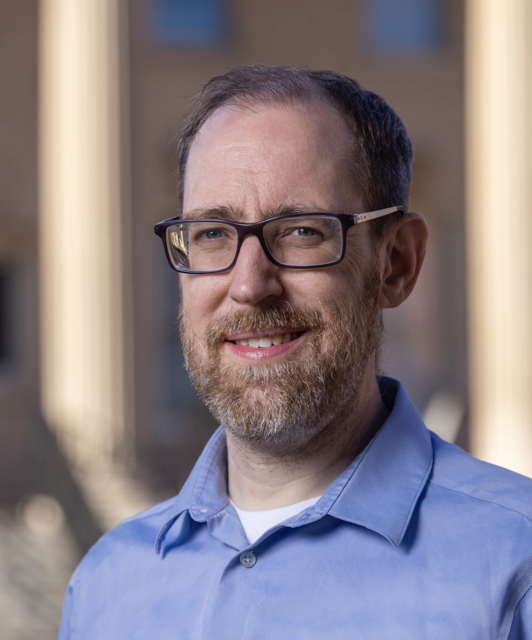Nathan E. Lewis, Ph.D.
Systems Biology
The University of Georgia
Recruited: 2024
The living cells of mammals hold enormous potential for treating a wide range of diseases and ailments. Nathan Lewis works to make more of these kinds of treatments possible – by exploring the inner workings of cells and their interactions with various building blocks of life, then applying that knowledge to advance the manufacturing of gene and cell therapies.
His approach involves using engineering principles, computational methods and experiments to edit genes in ways that make living cells and their products more suitable as therapeutics – and it’s an approach that carries enormous implications for the biopharma industry.
Lewis came to the University of Georgia from UC-San Diego primarily to engineer gene and cell therapies that are safer, more effective and more scalable in manufacturing. This involves growing mass quantities of cells suitable for treatment, an incredibly challenging undertaking. But UGA, Lewis says, is uniquely equipped for the challenge. The university is a global leader in complex carbohydrate research, an area highly relevant to cell engineering and manufacturing. UGA also operates a 10,000-sq. ft. Bioexpression and Fermentation Facility for growing cells, and it’s adding sophisticated technologies through a biofoundry that support the innovations Lewis is developing.
Lewis’s work at UGA began a new chapter in a storied career in systems biology. In 2010, while pursuing his Ph.D. at UCSD, Lewis worked with a startup to harness the potential of cells from Chinese hamster ovaries (CHO cells) to produce new drugs. Lewis first modeled the chemical reactions taking place inside the cells and later co-led the sequencing of the hamster’s genome. Both activities greatly enhanced CHO cells as a leading resource for manufacturing new drugs coming to market.
Lewis built on that success by working to evolve the use of genes and cells for treatments. After a postdoc research stint at Harvard Medical School and an assistant professorship at Brigham Young University (his undergrad alma mater), he returned to UCSD in 2014. Earlier at the university, he’d helped write a major grant proposal that was funded by the Novo Nordisk Foundation. So, UCSD invited him back to lead some of the research activities under the grant – notably, investigating and engineering processes inside and among CHO cells to improve the quantity and quality of drugs produced in the cells.
The research effort ultimately brought in more than $50 million in outside grants, and Lewis published several important papers. One documented how he and colleagues used computer algorithms and experiments to remove genes that produced unwanted proteins in Chinese hamster ovary cells. With the proteins removed, the cells produced many more of the monoclonal antibodies that are prized in developing treatments for cancer and autoimmune disorders.
Another paper described how Lewis and colleagues edited a whole circuit of genes at once in CHO and human cells, solving a problem that hampered the scaling of drug production for decades. The achievement brought new understanding of cancer cell metabolism. Controlling this metabolism, they found, may also help control cancer cells themselves.
Lewis also used a systems approach to explore how connections inside and among cells influence autism. His 2019 NIH-funded study revealed that disruptions in certain gene networks in toddlers could contribute to autism spectrum disorders (ASDs). It also uncovered molecular markers in the blood that can help identify the risk for autism much earlier.
He sharpened that diagnostic accuracy three years later, when he and fellow researchers developed a statistical model – an ensemble classifier – that used genetic information to correctly identify 88% of a study group of children as having ASD. A third significant project, in 2024, centered on subtyping autism, allowing more precise study of the severity of autism. It showed that the disruption of gene pathways in children with profound autism affected their brain development and DNA repair, suggesting that the biological causes of profound autism differ from those of milder forms.
The year 2021 brought ventures of a different kind for Lewis: Beyond his work in the lab, he co-founded three startup companies. NeuImmune leverages engineered cells to modify large carbohydrate molecules, called glycans, in CHO cells to improve the safety and potency of drugs. Augment Biologics focuses on protein engineering to control glycans on therapeutics. Finally, the technologies developed by Lewis and AlatiCell aim to lower the cost of cancer diagnosis by using AI to analyze glycoproteins.
Research
- Cell-cell interactions in neurodevelopment, immunology and pediatric health
- Systems glycobiology: deciphering sugar-coated communication
- Engineering of mammalian cell systems for therapeutic production
Choosing Georgia
“There's a lot of amazing resources and research going on here, and UGA has a world-class reputation in glycobiology. The faculty here are addressing the right questions and getting the necessary major grants to build a very competitive environment to facilitate cell and biotherapeutic manufacturing.”

